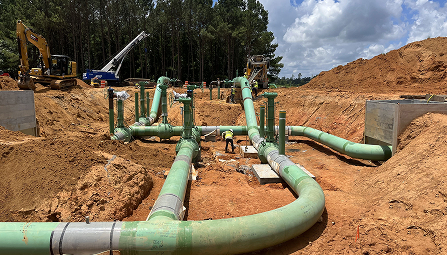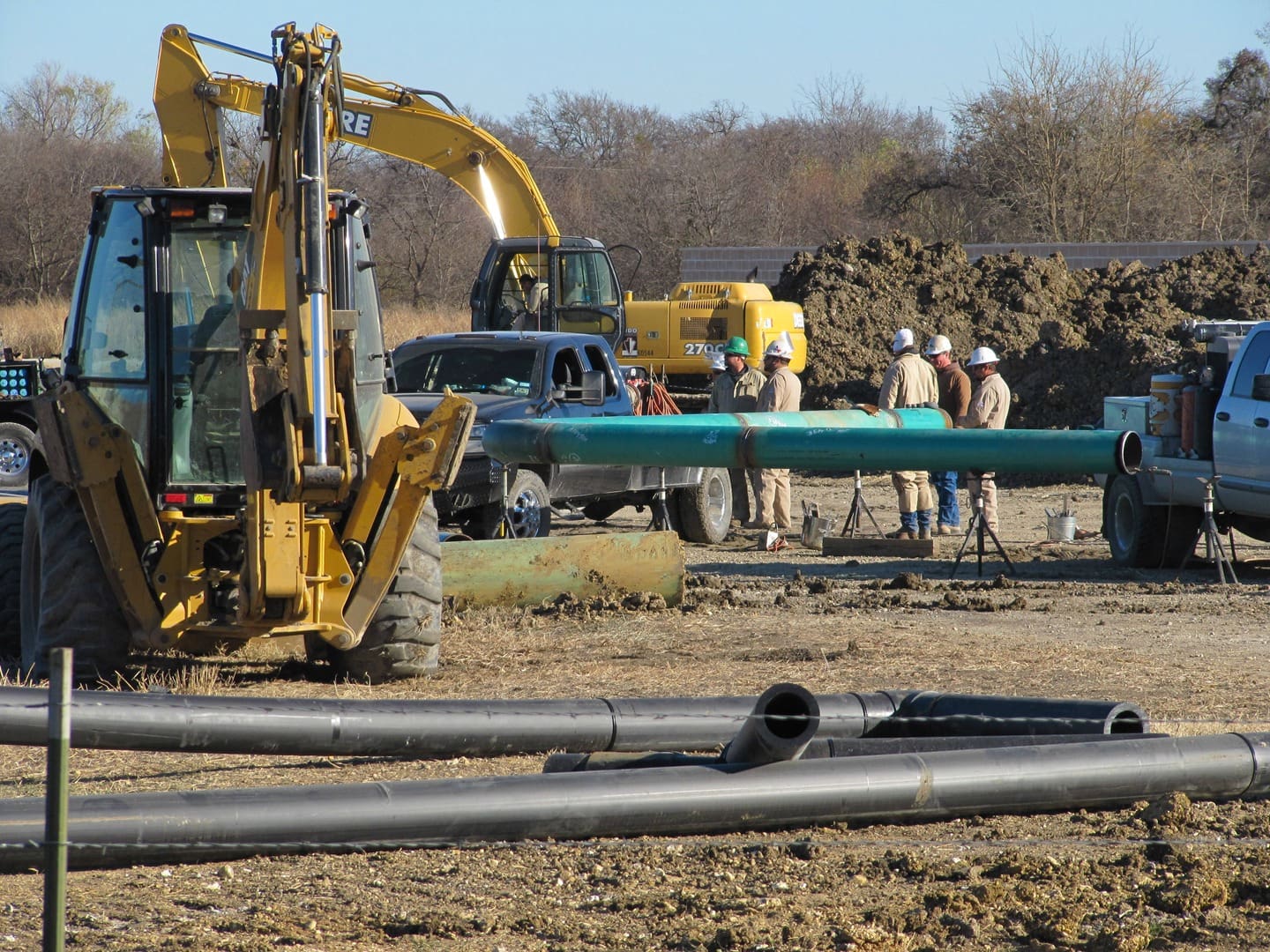The Vital Guide to Understanding Pipeline Construction Providers and Their Value
Pipeline Construction services are fundamental to the transportation of crucial sources such as water, gas, and oil. These solutions include precise preparation and implementation, adhering to stringent safety and security and ecological standards. As the sector adapts to contemporary difficulties, understanding its parts and ramifications ends up being increasingly vital. What aspects add to the expanding relevance of these services in today's economic situation? The complying with sections will explore these essential elements.
Overview of Pipeline Construction Providers
Pipeline Construction services incorporate a series of activities crucial for the setup and upkeep of pipelines made use of to carry various compounds, including oil, water, and gas. These solutions are vital for assuring the efficient and secure movement of sources from one place to another. The procedure generally begins with detailed preparation and design, which thinks about regulative needs, environmental considerations, and logistical obstacles.
Excavation and grading of the land are carried out to prepare the website for Pipeline installment once planning is total. This is complied with by the real laying of the pipelines, which entails welding or joining sections together to produce a constant circulation course. After installation, rigorous testing is carried out to ensure stability and safety and security. Maintenance services are also offered to deal with any type of concerns that might emerge with time. Overall, Pipeline Construction services play a critical function in supporting framework for energy and water distribution.
Secret Parts of Pipeline Construction
A successful Pipeline Construction job relies upon a number of essential components that guarantee the effective and safe installment of the Pipeline system. Initially, detailed website analyses are vital, as they recognize the ecological and geographical aspects that may affect Construction. Next off, the choice of proper materials, such as installations and pipes, is vital for securing resilience and compatibility with the carried materials.
Progressed Construction methods, consisting of trenchless innovation and directional drilling, boost effectiveness and minimize ecological impact. Reliable project monitoring is one more crucial part, collaborating labor, devices, and timelines to meet task goals.
Additionally, interaction amongst stakeholders, including engineers, specialists, and neighborhood authorities, assurances positioning on project specifications and demands. Lastly, extensive quality assurance procedures throughout the Construction procedure make certain compliance with sector standards and optimize the Pipeline's operational life expectancy. Collectively, these elements create the backbone of a successful Pipeline Construction job.
Security Standards and Regulations in Pipeline Construction

Governing bodies, such as the Occupational Safety and Health Administration (OSHA) and the Pipeline and Hazardous Materials Security Administration (PHMSA), stated particular requirements that govern Construction practices. These include protocols for equipment usage, employee training, and emergency situation feedback treatments. By applying these criteria, Construction business not only safeguard their employees but also safe and secure public trust. Inevitably, extensive security steps add to the long-term success of Pipeline tasks, guaranteeing they satisfy both operational and environmental expectations.
Environmental Factors To Consider in Pipeline Projects

Environmental factors to consider are indispensable to the preparation and execution of Pipeline tasks. These jobs should analyze possible influence on communities, water resources, and neighborhood wildlife. Conducting thorough ecological impact analyses (EIAs) is vital, permitting stakeholders to determine and minimize dangers before Construction starts.
Securing delicate locations, such as wetlands and habitats, often needs carrying out particular design functions or alternate routing to reduce disturbance. Additionally, Pipeline operators are entrusted with developing techniques for stopping spills and leaks, which can have devastating effects on the environment.
Interaction with regional communities is important, as public concerns can cause job modifications that enhance environmental management. Compliance with guidelines set by environmental companies ensures that tasks fulfill sustainability standards, cultivating a balance in between framework requirements and environmental conservation. Inevitably, resolving environmental considerations not only safeguards nature but likewise promotes neighborhood count next on and job feasibility.
The Function of Modern Technology in Pipeline Construction
Modern technology plays an essential role in modern Pipeline Construction, enhancing efficiency and precision. Advanced evaluating strategies permit for exact preparation and execution, reducing environmental impact and task hold-ups. Furthermore, the combination of automation and robotics improves operations, lowering labor expenses and improving security on Construction sites.
Advanced Surveying Techniques
Advanced evaluating strategies play a vital function in the successful implementation of Pipeline Construction tasks. These approaches utilize sophisticated innovation to guarantee precise mapping and analysis of the surface where pipelines will be mounted. Methods such as Geographic Information Systems (GIS), LiDAR (Light Discovery and Ranging), and 3D modeling allow engineers to assess the landscape and envision, recognizing ecological issues and potential barriers. By weblink utilizing these innovative tools, groups can improve precision in placing and positioning, greatly minimizing the risk of mistakes throughout Construction. Furthermore, real-time data collection enables for immediate modifications and educated decision-making throughout the job lifecycle. Eventually, these evaluating developments add to improved performance, safety, and sustainability in Pipeline Construction initiatives.
Automation and Robotics

Economic Impact of Pipeline Facilities
Pipeline framework plays a necessary role in helping with and forming local economic climates profession. By providing a trustworthy means of delivering oil, gas, and various other commodities, pipes lower transportation costs and improve supply chain performance. This framework attracts financial investment, boosts work creation, and fosters economic growth in surrounding areas.
The Construction and upkeep of pipes add substantially to neighborhood economies, creating numerous employment opportunities in various industries, from engineering to labor. The influx of jobs frequently leads to boosted costs in regional companies, even more reinforcing economic activity.
Additionally, pipelines boost power safety by making sure a secure supply of sources, which is essential for residential demands and commercial procedures. As regions become adjoined via Pipeline networks, they access to broader markets, increasing competition and economic resilience. The economic influence of Pipeline facilities is multifaceted, affecting both immediate regional economic climates and wider local advancement.
Future Trends in Pipeline Construction Solutions
The future of Pipeline Construction services is progressing in reaction to technical improvements, regulatory adjustments, and growing ecological considerations. Advancements such as drones and robotics are simplifying evaluation and upkeep processes, boosting safety and effectiveness. Automation is poised to minimize labor costs and enhance accuracy in Construction operations. Furthermore, the raising emphasis on sustainability is motivating companies to embrace eco-friendly materials and methods, straightening with worldwide efforts to reduce carbon footprints.
Governing structures are likewise adapting to deal with ecological influences, promoting higher openness and liability in Pipeline jobs. Moreover, the assimilation of smart innovations, consisting of real-time surveillance systems, is anticipated to enhance the dependability and efficiency of Pipeline networks. As power needs change towards renewable sources, Pipeline Construction services will likely see an increase in jobs connected to biofuels and hydrogen transportation. Generally, these fads show a transformative duration for the Pipeline Construction sector, concentrated on innovation and sustainability.
Frequently Asked Questions
What Kinds of Pipelines Are Commonly Constructed?
Various types of pipes are commonly created, consisting of oil, gas, sewer, and water pipelines - Pipeline Construction Services. Each offers distinct purposes, facilitating the transport of essential sources throughout regions while adhering to safety and environmental regulations
For how long Does a Normal Pipeline Job Take?
The period of a normal Pipeline job varies greatly, usually varying from a see it here number of months to a couple of years. Elements influencing this timeline include task complexity, regulatory authorizations, and ecological considerations that must be attended to.
Who Regulates Pipeline Construction Companies?
Pipeline Construction firms are controlled by various government, state, and regional agencies, including the Pipeline and Hazardous Products Security Administration (PHMSA) and state public energy compensations, guaranteeing conformity with security and environmental criteria throughout the Construction process.
What Prevail Products Used in Pipeline Construction?
Usual products used in Pipeline Construction consist of polyethylene, pvc, and steel. Each material uses distinct benefits such as adaptability, resistance, and durability to rust, making them ideal for various applications in moving fluids and gases.

How Are Pipeline Construction Prices Approximated?
Pipeline Construction costs are estimated by evaluating elements such as material expenditures, labor rates, task intricacy, ecological considerations, and governing demands (Pipeline Construction Services). Accurate cost estimate assurances reliable budgeting and job preparation throughout the Construction process
Pipeline Construction services incorporate a range of tasks necessary for the setup and upkeep of pipes used to transport numerous substances, consisting of oil, water, and gas. An effective Pipeline Construction task depends on several crucial components that assure the safe and effective setup of the Pipeline system. Advanced surveying methods play an important function in the successful execution of Pipeline Construction tasks. Different kinds of pipelines are frequently constructed, including oil, water, sewage, and gas pipelines. Pipeline Construction expenses are approximated by analyzing elements such as product costs, labor prices, task complexity, environmental factors to consider, and regulatory requirements.